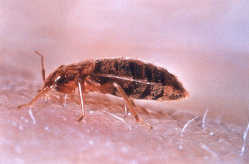Health officials warn of threat of bed bugs

Bed bugs, quarter-inch and smaller insects that feed on the blood of humans and animals, have become a growing concern across the country.
Darrell Brackney, an environmental health specialist with the Putnam County health department, said the bugs have been found in respectable hotels, and they can be transferred in luggage and clothing after a stay. He also said that the bugs have experienced a recent resurgence.
"They were unheard of since back in the 50s because DDT and stuff like that had pretty well wiped them out. With those kinds of chemicals and things gone, they're making a comeback. They're pretty resilient, so they're hard to get rid of if you've got them," Brackney said.
The difficulty in getting rid of the pests leads to Brackney's suggestion for dealing with the bugs.
"The best way to deal with bedbugs is to prevent them from the beginning. If you get them, don't try to get rid of them yourself; you're going to have to call a professional."
A release from the Indiana State Department of Health suggestions that people check the seams of mattresses for black or brown spots, check the whole bed for small blood stains and their amber colored shed skins. It also suggests to check your body for bite marks, and to look in box springs, bed frames, chairs, the edges of rugs, carpets, drawers, baseboards, backpacks, sleeping bags and clothes for the bugs.
"Don't leave laundry lying in a pile," Brackney said. "If you do travel somewhere, keep your suitcase off the floor and off the bed. As soon as you get home, wash your clothes and maybe keep them in a plastic bag in transit. Dry them in a hot dryer and wash them in real hot water."
The department of health also suggests people be cautious when purchasing used furniture and clothing and to avoid taking things from the dumpster.
People can also eliminate clutter that bugs can hide in and vacuum under beds and other hiding places, then empty the vacuum into a trash bag and immediately put the trash bag outside.
"It's certainly one of the main ways they get transferred," Brackney said.
